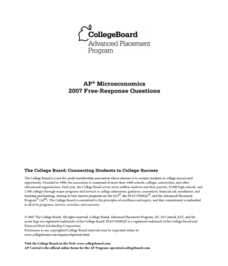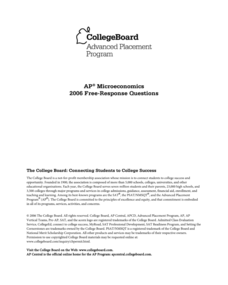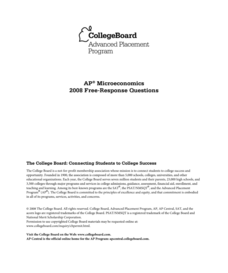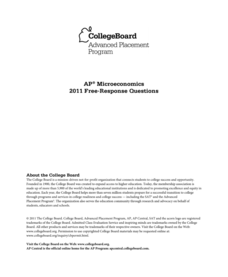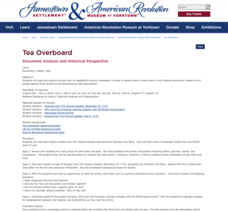US National Archives
WWII: Western Europe 1939-45 – Resistance and SOE
Germany seemed to be unstoppable in the early years of World War II, but the tireless and sacrificial work of the Special Operations Executive (SOE) helped to steer the war in another direction. After exploring primary source documents,...
US National Archives
WWII: Western Europe 1939-45 – Occupation
Warsaw, Poland, suffered much of the blunt of World War II—but according to Polish letters from the early days of Nazi occupation, other parts of the country were much worse off. High schoolers use the letters and contemporaneous...
US National Archives
WWII: Western Europe 1939-45 – Invasion
Without the benefit of history, Western Europe in the 1940's had no idea what was about to befall them. Class members use primary sources, including political cartoons, videos, and internal documents, to analyze how much of a threat...
College Board
2007 AP® Microeconomics Free-Response Questions
A monopoly gives a company exclusive rights to a market. What is the impact of that decision on the economy? Problem sets from College Board explore this question, as well as variables in labor markets and government regulations on profit.
College Board
2009 AP® Microeconomics Free-Response Questions Form B
Two transportation companies must decide the best way to compete. How will that decision affect their prices? Using College Board materials, future test takers examine the problem and think critically to solve it. Other prompts examine...
National Endowment for the Humanities
Lesson 2: The United States, France, and the Problem of Neutrality, 1796–1801
While the French Revolution could be considered inspired by the American Revolution, it created thorny problems for the new United States. Should the United States get involved and be drawn into a European drama? Was the US strong...
National Endowment for the Humanities
Lesson 3: Britain, Napoleon, and the American Embargo, 1803–1808
While the French were once the allies of Americans, the Napoleonic Wars saw the United States almost drawn into a war with its one-time friend. Wars in Europe threatened to draw in the early republic. A primary source-based activity...
National Endowment for the Humanities
Lesson 1: The United States Confronts Great Britain, 1793–1796
After the Revolutionary War, the success of the United States was far from guaranteed. Foreign powers coveted the new land, and Great Britain challenged American sovereignty. Learners consider the challenges facing the new nation using...
College Board
2006 AP® Microeconomics Free-Response Questions
Communities often experience a tug-of-war between a desire for open space and a need for development. How can governmental policy affect each side of the issue? Scholars consider the question, along with queries on pricing and...
College Board
2007 AP® Microeconomics Free-Response Questions Form B
In many industries, one company has a monopoly or has government assistance. How does this affect profits and the economy at large? A set of problems from College Board explores this.
College Board
2008 AP® Microeconomics Free-Response Questions
The government can tweak the economy through a variety of tools. What are their long- and short-term effects? A problem set from College Board examines how the government sometimes pulls the strings to control the economy.
College Board
2008 AP® Microeconomics Free-Response Questions Form B
Vaccinations prevent disease, but do they impact anything else? Some may not realize they also have an economic impact. A set of questions from College Board asks learners to consider what, exactly, that impact is. Other practice prompts...
College Board
2009 AP® Macroeconomics Free-Response Questions
Political instability often rattles a country. How does it affect the economy? Scholars consider look at the issue using College Board materials. Additional questions examine the role of interest rates and reserve banks to provide...
College Board
2010 AP® Microeconomics Free-Response Questions Form B
It's not uncommon to pay a toll to cross a bridge. But what happens to the price of that toll if it's charged to make a profit? Learners use materials from College Board to figure out their answers. Other questions examine issues of...
College Board
2010 AP® Microeconomics Free-Response Questions
When the demand for ethanol goes up, what does that do to corn farmers, who provide a key ingredient? Learners ponder the connection using authentic College Board prompts in preparation for AP® or other exams. Other questions consider...
College Board
2011 AP® Microeconomics Free-Response Questions Form B
What could be the link between a college education and reduced crime rates? Learners consider the question using authentic College Board materials. Other practice sets examine the effects of price and competition in various case studies.
College Board
2011 AP® Microeconomics Free-Response Questions
The price of avocados is holding steady. What happens when the competition for labor to grow them intensifies? Learners consider this and other questions about supply and demand and the effects of monopolies using authentic College Board...
College Board
2012 AP® Microeconomics Free-Response Questions
A train company is experiencing losses. What happens if it raises prices: will it make up for its lost revenue, or wind up more deeply in the hole? Learners consider the dilemma, along with other questions regarding supply and demand...
College Board
2013 AP® Microeconomics Free-Response Questions
People often set off fireworks to celebrate. What is the cost of the annoyance of their neighbors? Economics help answer that question! Learners consider this problem, along with prompts on price and competition, using College Board...
College Board
2014 AP® Microeconomics Free-Response Questions
What effect do dynamics, monopolies, and the balance of skilled and unskilled labor have on a market place? How does supply affect the price of gasoline? Learners consider these questions and more using College Board materials as they...
College Board
2015 AP® Microeconomics Free-Response Questions
Two sandwich shops must decide whether it's to their benefit to set pricing together. What happens when the government also intervenes with a price subsidy? Learners consider these questions as they tackle prompts from College Board....
Jamestown-Yorktown Foundation
Why Did Some Colonial Virginians Seek Independence?
To understand the reasonings of those colonials who sought independence from England, young historians are divided into content groups that examine documents related to either the Boston Tea Party, the Yorktown Tea Party, Tea Overboard,...
Jamestown-Yorktown Foundation
Tea Overboard
While less well known than the event in Boston, the Yorktown Tea Party was equally decisive in turning community sentiment against Great Britain. To gain an understanding of why the colonists objected to the Tea Act, young historians...
Jamestown-Yorktown Foundation
Life of a Private Lesson Plan
In order to understand the challenges the Continental Army faced during the American Revolution, class members analyze primary source materials including a soldier's journal and an officer's letter, and watch a short reenactment video.





